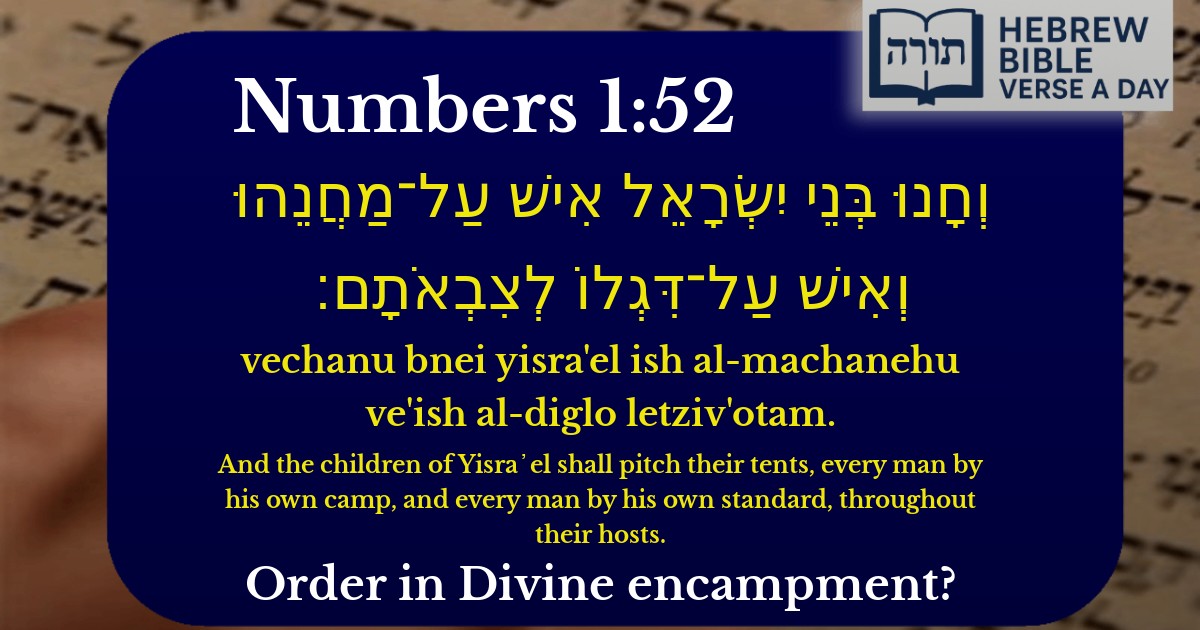Join Our Newsletter To Be Informed When New Videos Are Posted
Join the thousands of fellow Studends who rely on our videos to learn how to read the bible in Hebrew for free!
Hebrew Text
וְחָנוּ בְּנֵי יִשְׂרָאֵל אִישׁ עַל־מַחֲנֵהוּ וְאִישׁ עַל־דִּגְלוֹ לְצִבְאֹתָם׃
English Translation
And the children of Yisra᾽el shall pitch their tents, every man by his own camp, and every man by his own standard, throughout their hosts.
Transliteration
Vechanu bnei yisra'el ish al-machanehu ve'ish al-diglo letziv'otam.
Hebrew Leining Text
וְחָנ֖וּ בְּנֵ֣י יִשְׂרָאֵ֑ל אִ֧ישׁ עַֽל־מַחֲנֵ֛הוּ וְאִ֥ישׁ עַל־דִּגְל֖וֹ לְצִבְאֹתָֽם׃
וְחָנ֖וּ בְּנֵ֣י יִשְׂרָאֵ֑ל אִ֧ישׁ עַֽל־מַחֲנֵ֛הוּ וְאִ֥ישׁ עַל־דִּגְל֖וֹ לְצִבְאֹתָֽם׃
🎵 Listen to leining
Parasha Commentary
📚 Talmud Citations
This verse is not quoted in the Talmud.


Context in Bamidbar (Numbers)
This verse (Bamidbar 1:52) appears in the context of the census and organization of Bnei Yisrael in the wilderness. Hashem commands Moshe to arrange the camp with each tribe positioned around the Mishkan (Tabernacle) in a specific formation, under their respective degel (standard).
Rashi's Explanation
Rashi (Bamidbar 1:52) emphasizes the precision of the arrangement: each tribe had its designated place and flag (degel), ensuring order and distinction among the camps. He notes that this structure prevented disputes, as no tribe could encroach upon another's position. The phrase "איש על מחנהו" ("every man by his own camp") reinforces that each individual's identity was tied to their tribal affiliation.
Symbolism of the Degalim (Standards)
The Midrash (Bamidbar Rabbah 2:7) elaborates on the significance of the degalim, comparing them to the banners of heavenly hosts. Each tribe's flag had unique colors and symbols corresponding to the stones on the Kohen Gadol's breastplate (Choshen), reflecting their distinct spiritual roles. For example:
Rambam on Order and Unity
In Moreh Nevuchim (3:45), Rambam explains that this arrangement cultivated both physical and spiritual discipline. The Mishkan at the center symbolized Hashem’s presence as the focal point of national life, while the tribes' orderly encampments reflected the harmony of a sanctified community. The phrase "לצבאתם" ("throughout their hosts") underscores that unity was achieved through structured diversity, not uniformity.
Practical Lessons from the Camp
The Talmud (Eruvin 2a) derives principles of communal boundaries from this verse, teaching that proper demarcation prevents conflict. Similarly, the Sforno (Bamidbar 1:52) highlights that every individual’s role—whether as part of a tribe or the collective—was essential for the nation’s mission. This model remains relevant for Jewish communities today, emphasizing the balance between personal identity and collective responsibility.